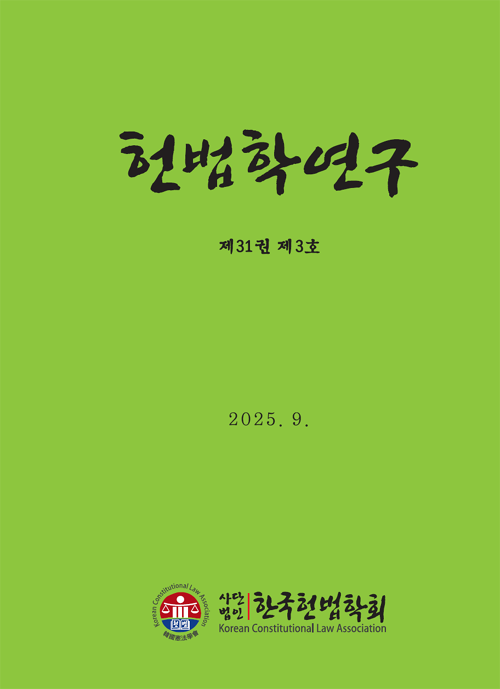- 영문명
- Constitutional Review of the Ministerial Directive on Teachers’ Student Guidance
- 발행기관
- 한국헌법학회
- 저자명
- 김소연(Soyeon Kim)
- 간행물 정보
- 『헌법학연구』第31卷 第3號, 431~477쪽, 전체 47쪽
- 주제분류
- 법학 > 법학
- 파일형태
- 발행일자
- 2025.09.30
8,440원
구매일시로부터 72시간 이내에 다운로드 가능합니다.
이 학술논문 정보는 (주)교보문고와 각 발행기관 사이에 저작물 이용 계약이 체결된 것으로, 교보문고를 통해 제공되고 있습니다.

국문 초록
오늘날의 교육제도에서 교육을 받는 학생은 교육의 주체이자 참여자로서의 지위를 갖는다. 학생은 교육의 중심에 존재하는 자이지만 미성년자라는 특징으로 인해 교육과 관련된 내용을 스스로 결정함에 있어서, 다른 교육 주체인 부모・교원・국가 등에 의해 그 결정권의 행사를 제한받을 수 있고, 때에 따라서는 제한받아야 한다는 당위성을 갖는다. 학생은 교육을 통한 자유로운 인격발현권 내지 학습권으로 설명되는 기본권의 주체로서 해당 권리를 행사할 수 있지만, 학생의 기본권이 온전하게 실현되기 위해서는 학생 외 교육의 주체로서 존재하는 부모・교원・국가의 역할, 즉 여러 교육주체들의 개별적이면서도 공통의 지향점을 가진 역할이 필요하다.
초・중등교육법 제20조의2와 같은 법 시행령 제40조의3에 근거한 「교원의 학생생활지도에 관한 고시」(이하 ‘교육부 고시’)는 교육활동 과정에서 학생의 일상적인 생활 전반에 관여하는 교원의 학생생활지도 권한의 범위와 방식을 규정한다. 교육부 고시에 따른 학생생활지도는 학생의 기본권과 교원의 직무범위를 상정함에 있어서 주요한 역할을 담당하는데, 구체적으로 이는 교원의 직무권한 범위 내에서 학생이 자율성을 가지고 자신의 기본권을 행사할 때 해당 기본권행사의 한계점이자 기본권제한의 시작점을 확인할 수 있게 해준다는 점에서 의미를 가진다.
그러나 학생생활지도는 행정규칙인 교육부 고시의 형태로 학생의 기본권을 제한하는 내용을 규정하고 있다는 점에서 비판을 받는다. 교육부 고시와 그 고시로부터 위임된 학칙에는 ‘수업 중 휴대전화 사용금지・학생분리지도・학생소지물품의 조사 및 분리보관’과 같이 학생의 기본권을 제한하는 내용이 규정되어 있다. 관련 조항들의 위헌 여부에 대해서는 그것이 교육부 고시 자체에 규정되어 있는 경우와 학칙에 규정되어 있는 경우를 구분하여 판단하는 것이 필요하다. 전자와 관련해서는 법령보충적 행정규칙으로서의 성격을 갖는 교육부 고시를 전제로 하여 법률유보원칙과 과잉금지원칙 위반 여부를 판단해 볼 수 있을 것이고, 후자와 관련해서는 자치규범으로서의 성격을 갖는 학칙을 전제로 하여 법률유보원칙 위반 및 평등권침해 여부를 검토해 볼 수 있을 것이다.
영문 초록
In contemporary educational systems, students occupy the dual position of being both the subject and participant of education. Although students are placed at the center of education, their capacity to independently determine matters related to education is constrained— and, in certain cases, normatively ought to be constrained—by other educational actors such as parents, teachers, and the state, due to their status as minors. While students, as holders of fundamental rights characterized as the right to free personal development and the right to learn, may exercise such rights, the full realization of these rights necessitates the involvement of other educational actors. The roles of parents, teachers, and the state—each distinct yet oriented toward a common educational goal—are indispensable for the effective exercise of students’ rights.
Ministerial directive on teachers’ student guidance (hereinafter “the Ministry of Education Directive”), issued pursuant to Article 20-2 of the Elementary and Secondary Education Act and Article 40-3 of its Enforcement Decree, delineates the scope and methods of teachers’ student guidance activities, which extend to students’ everyday lives in the course of educational practice. Student guidance under the Ministry of Education Directive plays a crucial role in framing the balance between students’ fundamental rights and teachers’ professional authority. Specifically, for students, such guidance is meaningful in that it provides a tangible basis for identifying both the limits of exercising their autonomy and the starting point of restrictions on their fundamental rights within the scope of teachers’ professional authority.
However, student guidance has been subject to criticism, primarily because the Ministry of Education Directive—despite its form as an administrative regulation—contains provisions that restrict students’ fundamental rights. Both the Ministry of Education Directive and school rules enacted under its delegated authority impose restrictions, such as prohibiting the use of mobile phones during class, student separation guidance, and the inspection and safekeeping of students’ personal belongings. These provisions raise constitutional concerns regarding potential violations of students’ fundamental rights. In addressing these issues, it is necessary to distinguish between cases in which restrictions are directly stipulated in the Ministry of Education Directive and those in which they are stipulated in school rules. With respect to the former, constitutional review should examine whether the Ministry of Education Directive, as a supplementary administrative regulation to legislation, violates the principle of statutory reservation and the principle of proportionality. With respect to the latter, constitutional scrutiny should focus on potential violations of the principle of statutory reservation and the right to equality, on the premise that school rules function as autonomous regulations.
목차
Ⅰ. 서론
Ⅱ. 교육의 헌법적 의의와 주체
Ⅲ. 학교교육에서 학생생활지도의 개념정의와 역할
Ⅳ. 「교원의 학생생활지도에 관한 고시」에 의한 기본 권제한의 위헌성
Ⅴ. 「교원의 학생생활지도에 관한 고시」에서 위임한 학칙에 의한 기본권제한의 위헌성
Ⅵ. 결론
참고문헌
키워드
해당간행물 수록 논문
- 헌법학연구 제31권 제3호 목차
- 민주공화적 권력구조로의 개헌방안 - 다단계 협치론을 중심으로
- 법제처 법령해석제도의 헌법상 의의와 한계
- 국민주권 의미에서 소버린 AI의 실현 방향
- 국회의원 선거구획정위원회에 관한 헌법적 연구
- 공직선거법상 비례대표 국회의원 후보자의 공개장소에서의 연설ㆍ대담 금지규정에 관한 헌법적 검토
- 국회의원의 세대 간 불균형에 관한 헌법적 고찰
- 디지털사회전환(DX)과 미래농업을 위한 헌법적 과제
- 국가인권위원회의 독립성 보장에 관한 헌법적 고찰
- 남성 병역의무 부담에 관한 헌법재판소의 평등심사 연구 - 갈등극복과 사회통합을 위한 합리적 이유논증의 필요성
- 연령차별의 합리성에 대한 재고 - 정년제도를 중심으로
- 알고리즘 시대 공론장의 위기와 표현의 자유
- SNS상의 표현의 자유의 한계 - 미국 수정헌법 제1조의 해석과 미국 연방대법원의 진정한 위협(true threats)의 적용 범위를 중심으로
- 「교원의 학생생활지도에 관한 고시」에 관한 헌법적 검토
- 아동학대 예방 및 처벌 규정의 헌법적 소고 - 아동복지법과 아동학대특례법의 주요 헌법적 분쟁사례를 중심으로
- 신 일리학파(Neo-Elyian)의 비교정치과정 이론과 약한 사법심사
참고문헌
관련논문
법학 > 법학분야 BEST
- 인공지능 판사, 과연 가능한가?
- 정치의 사법화와 사법의 정치화 : 온건하고 실용적인 헌법재판의 당위성
- 자국 우선주의 정책과 국제법상 난민⋅이민자 보호-트럼프 행정부의 미국 우선주의를 중심으로-
최근 이용한 논문
교보eBook 첫 방문을 환영 합니다!

신규가입 혜택 지급이 완료 되었습니다.
바로 사용 가능한 교보e캐시 1,000원 (유효기간 7일)
지금 바로 교보eBook의 다양한 콘텐츠를 이용해 보세요!



